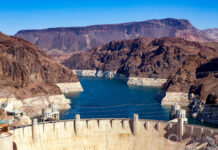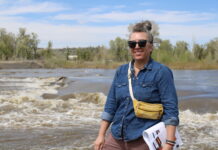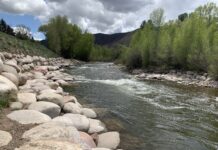Once a showcase of American optimism and engineering, Hoover Dam faces new power generation...
The long-term drying of the American Southwest poses a gathering and measurable threat to hydropower generation in the Colorado River basin.
Should Lake Mead, the reservoir formed by Hoover Dam,...
When flows are low, river recreators seek out new allies and avoid making enemies
What used to be a calm stretch of the Yampa River near Craig, Colorado, now boasts a new set of rollicking whitewater rapids.
They’re not the result of some new...
Colorado communities have spent millions of dollars on whitewater parks. Are they worthwhile?
There’s an old catchphrase that Colorado kayak park proponents used in the early 2000s to sell the idea that keeping water in streams mattered just as much as water...
Colorado has unique protections for river recreation, but do they have enough legal muscle?
David Hajoglou sat on the rocks next to a rushing stretch of river in Golden, Colorado. As he scouted a kayak route through the riffles and waves, he thought...
Data centers a small, but growing factor in Arizona’s water budget
BUCKEYE, Ariz. – It was supposed to be called Cipriani, a master planned community with more than 9,700 homes at the western fringe of this sprawling desert city in...
As Colorado ramps up PFAS drinking water tests, small towns brace for costly fixes
Renee Hoffman was never thrilled about the water quality at her house in Sleepy Bear Mobile Home Park on the outskirts of Steamboat Springs.
“It just didn’t taste great,” she...
At Phoenix’s far edge, a housing boom grasps for water
BUCKEYE, Ariz. – Beneath the exhausting Sonoran sun, an hour’s drive west of Phoenix, heavy machines are methodically scraping the desert bare.
Where mesquite and saguaro once stood, the former...
Wyoming’s Colorado River water rights in jeopardy without improved info, official warns
Wyoming’s water chief wants emergency funds for hydrologists to measure flows in the state’s portion of the troubled Colorado River Basin, documentation he said is vital to preserving irrigation...
In “Water Bodies,” Western writers tap into intimate connections to their local waterways
In the arid West, water verbs are often bureaucratic. Rivers, streams and lakes are allocated, decreed, diverted, divided and used. Droplets are distributed to serve human needs. Scarcity drives...
Desalination helps meet water shortfalls in parts of the world. Is it a viable...
State Sen. Kevin Priola traveled to Israel in 2022 and came away with an idea: If the arid country can produce drinking water by taking the salt out of...












